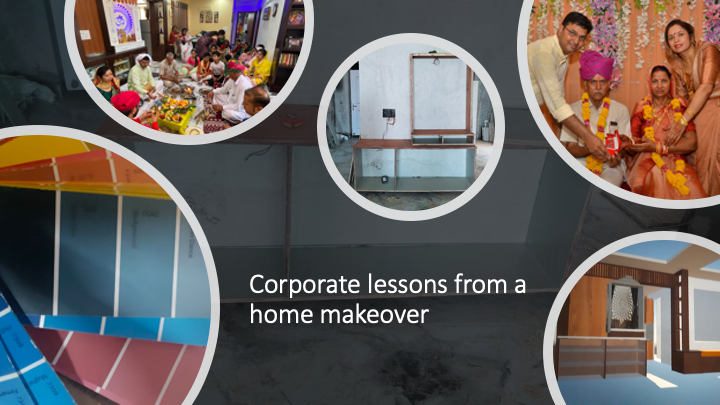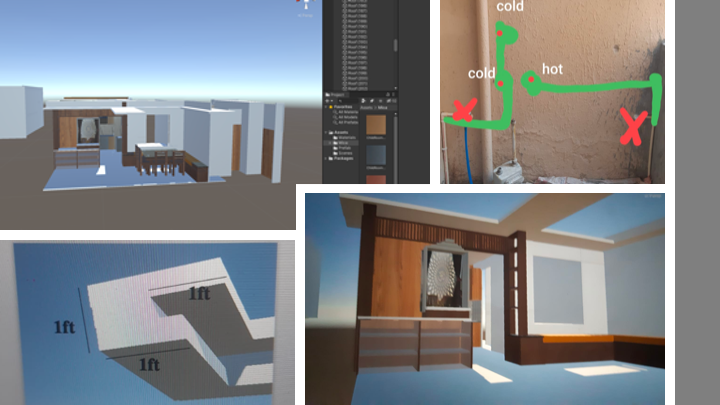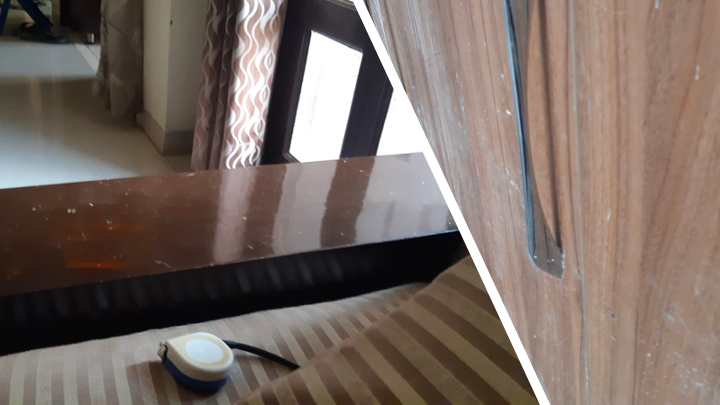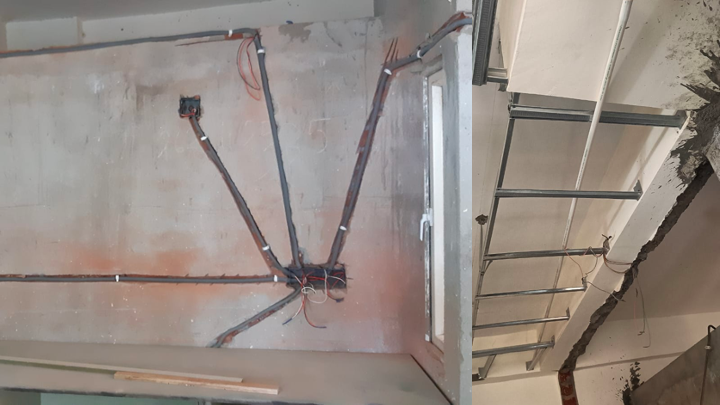Corporate lessons from a Home Makeover
- 8 minutes read - 1685 wordsRecently I shared an article on my life lessons from my father’s work life, and mentioned that I dedicated a new home to my father’s work life, also promised that I will share some corporate lessons learned from making-over this new home. I can well relate my takeaways to the corporate experiences such as vendor selection, negotiation, solutioning, estimation, prioritization, agility and being a trusted partner and many more..

As I keep saying “we learn every day in all situations of life, good or bad”
Here also, I learned a lot while working and dealing with mason, carpenters, electrician, plumbers, authorities and contractors. I also tried to apply my earlier learning, use technology to better communicate my need to these work executors.
I invited quotations from different contractors, and make-over agencies and got varied offers. Everyone came up with great features, style of deliveries, and showed their past work. I learned new ways of negotiation and balancing the scope, and prioritizing things when you have X budgets. It’s not that I selected the best one to go ahead, or was the best fit to my needs, but it was an experience. It was nothing less than our corporate projects, where things change as we proceed - requirements, schedule, and budget. No matter how strongly we say “this is what I need” and “give me the fixed estimates’’. So how should we bid, what should be the estimated cost? Is the cost the only factor in getting selected? Why does a particular vendor get selected over the others despite higher estimates or lesser comparative features? I looked back at my decisions and I see them as corporate lessons. Other areas I will reflect on are people’s capability that they don’t realize, or how their short sighted vision is impacting the long term path.
Here I start, following are the top 5 corporate lessons I learned from this home makeover exercise, which run for around 6 months.
Pitch for the ask, not your capability
I met multiple vendors and contractors before choosing the one. Some were focused on showcasing the capability on what they have done, and taken me to multiple locations to show their work, some were focused on showing the number of people working under them, some has shown how transparent their payment plan is, and focusing in discounts, some were showing very professional style printed quotations, and some were talking about bringing experts architects in designing home etc. However, only a few were talking about what I need, do I really need a very professional and expensive setup? Do I really need an expert interior designer? How to reuse existing investment? how to work optimally? and how important is the cost factor for me? What are my priorities? where would I be ready to compromise?.

Finally, I went ahead with an average contractor, who can implement my own designs, and can work on my terms. I asked him if he understood my need, and he responded that I am not looking for very expert/expensive architects. I do have my own designs, and I am a technology person who can talk to workers and convey what I need, and I would closely monitor the work, and I don’t have time to manage logistics and transportations etc. I can say he closely understood my need. Knowing this he was also able to provide relatively lower indicative cost estimates, but kept some parts vague, he was kind of sure that my requirements will change as I go, and I liked his confidence. I have worked with this contractor years ago for a relatively small job. He wasn’t great that time in terms of discipline on schedule and managing things but I believed in these years he gained experience and he might well fit this time.
Cost and budget may not be as important as it looks
Cost and budget may be the key criteria for getting selected, I also selected the one who came with a competitive cost. His offer was not comparatively too high or too low against others, but it was different, he defined a range for different items, and shared his experience that my budget will really change and things will change on the go, he was also keeping some buffer, and if things go beyond that buffer then I needed to pay accordingly. He kept a lot of things optional. I was feeling empowered that the cost is in my hand.
So a balanced pitch is better, too high or too low will keep you out of the race. However, showing flexibility is key here and vagueness may be fine and calling out the buffers and unknowns helps. Most important part is to empower the client to control the cost.
By the time we finished the home makeover, my requirements were changed, my contractor was right, and I ended up paying 50% extra in 30% additional time, however I still feel that cost was in my control. In most corporate worlds there are hardly any projects that run within budget from where we start, requirements keep changing, and we end up something different. So, in the long run, what we want to build is more important than initial budget and cost. If the customer is happy with what they have been building and it is meeting their expectations then the customer may be ready to invest more, but if things do not go as expected then the customer would not be happy investing even the agreed budget. In later cases if a customer is still investing, then we are at a losing end even if we are getting paid.
Don’t assume that the client fully know the ask
As I explained in the last section, I had some budget in mind, and had some idea what I wanted to do, but did I know exactly what I wanted to do? Answer is NO. My requirements were changing as I proceeded, due to inputs from family, cost trade offs, looking more options, and seeing how things are progressing. Input from the contractor and experts working with him created a good influence on the decisions I made.
Same goes with corporate projects, if the client has selected us, they have most trust in us to provide a solution, and they believe in our experience believe that we will provide the right inputs/options at the right time. If we are just order takers then we would end up with just the work that we have signed up for, but if we become a trusted partner for them, and provide our expert opinions on what our client should be doing, then we will go a long way.

Yes, we can do, and here are the options
Let me share my experience with a carpenter who was working under the contractor I selected. The carpenter was really good at his work, however the only challenge was whenever I asked for a change or correction in the work he finished, his first response was “NO” with a lot of resistive reasoning. On the other hand when I talked the thing to the contractor, the response was “YES, this can be done, at this cost or with these options”. This matters a lot in the long run. Despite the great potential of the carpenter, I would prefer working with the contractor then the carpenter, as I know he would get my work done with the same carpenter or maybe with some other not so good carpenter. Hard skill plays a role, but in long you need some other soft-skills.
In our corporate life as well, if we focus more on the solutions then we would be on the path of growth, and we will solve customer’s problems, else there may be 1000 reasons for not doing things. Try to share multiple options with pros and cons, with your recommendations, and then let your clients share their inputs, negotiate and find the middle path. Be flexible on your terms, remember “you are the expert” and providing a solution is in the best interest of you and the client even if it costs more to you, which may not have been thought of originally. Share your resistance to the client, they would understand. Even if they don’t understand now, it will pay off in future. Don’t let short sighted vision overpower the long term opportunity.
Be a trusted partner
I had worked with the contractor I selected, however at that time he was just starting his business, and was not having experience. He did a relatively small assignment for my old home years ago, his work was satisfactory. He was able to crack this new contract with me despite his new offer not being the best offer available to me.
He showed the same empathy this time as well, has shown great flexibility, and helped at various stages and even the area beyond his scope. For example, transporting some old furniture from old location to new location, and getting them repaired when I was busy in office work.

We need to be a trusted partner for our clients, and build a trust that we are here to solve their problems, just ask us, we will find a way. Don’t worry. At times if a client says they left with no money to pay our cost, help them by different ways such as discounts, delayed payment plan, or co-investing or something else. Of Course we can support the client within our limits and capacity. If we can’t help, then maybe we can help them in finding the right people. Becoming a trusted partner is a key, solve their issues by putting yourself in their shoes. It will take us really long.
These are the top 5 learnings from my home makeover, and after writing them together in this article, I realized that these are almost similar things I explain to participants of “Consulting Mind Workshops” at thoughtworks, when they ask “what it means to be a good consultant”. So in a nutshell, I can say what I learned is “Being a better consultant”.
#motivational #technology #ar #work from home #general #impact #motivational #life #reflection #takeaway #learnings #experience #change #xr #thoughtworks